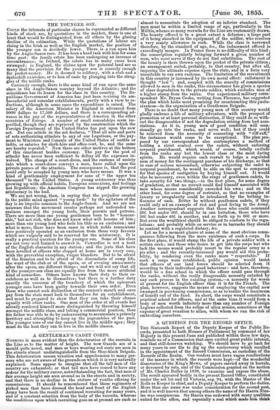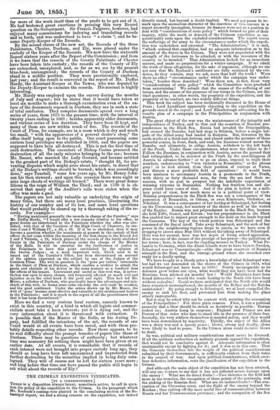A QUESTION FOR THE RECORD OFFICE.
THE Sixteenth Report of the Deputy Keeper of the Public Re- cords, presented to both Houses of Parliament by command of her Majesty in this present rune and published within these few days, reminds us of a Commission that once excited great public interest, and that still deserves watching. We should have to go back for many years in our file to dig up the controversy which resulted in the appointment of the Record Commission, as custodian of the Records of the Realm. Our readers must have vague recollections of the manner in which the records were kept—of the wonderful discoveries of the King's Mews, of papers carried away in barrels, or devoured by rats and of the Commission granted on the motion of Mr. Charles Buller in 1839, to examine and expose the abuse. The result appeared bodily in the present Record Office, constituted under the act 1st and 2d Victoria, cap. 94, with the Master of the Rolla as Keeper in chief, and a Deputy-Keeper to perform the duties. More than one name was under consideration for the second post, and it is well known that among others the name of Sir Harris Nico- las was conspicuous. Sir Harris was endowed with many qualities suited for the office, and especially a zeal which made him think far more of the work itself than of the profit to be got out of it. He had bestowed great exertions in pressing this very Record question on the Government. Sir Francis Palgrave, however, had enjoyed many commissions for indexing and translating records and so forth, and was understood to have "a claim "; and he be- came Deputy-Keeper of the Records. By the second clause of the new act, the Records of the three
Palatinates, Chester, Durham, and Ey, were placed under the custody of the Keeper of the Records. We now have the sixteenth Report sixteen years after the Report of the Commission; and from it we learn that the records of the County Palatinate of Chester have been taken into custody ; the records of the County of Ely are untouched, unexplored, and, so far as we see by the present blue-book, unrecognized; the records of the County of Durham stand in a middle position. They were provisionally explored, last year; and the result is conveyed in the report of Mr. Duffus Hardy, the Assistant-Keeper at the Tower, who.was deputed by the Deputy-Keeper to examine the records. His account is highly interesting. Mr. Hardy was employed upon the survey during the months of July and August; but he states that it would have taken at least six months to make a thorough examination even of the na- ture of the documents reposed in Durham, they are in such a state of total confusion. They comprise documents spread over a long series of years, from 1613 to the present time, with the interval of twenty years ending in 1661; besides apparently older documents, and various series of less duration. They have been ill kept, and many of them are now within reach of lire. The records of the Court of Pleas, for example, are in a room which is dry and much too small, "with the appearance of a general dealer's shop," the office itself being open to the public. One court possessing some curious local privileges was abolished in 1836, and the papers are supposed to have been all destroyed. This is not the first time of such destruction. The executors of Bishop Cosine procured the destruction of all the early minutes belonging to the see; because Mr. Basset, who married the Lady Gerrard, and became entitled to the greatest part of the Bishop's estate, "thought fit, for pre- venting disputes which might arise about his estate, to direct that all the Bishop's writings should be burned; which was accordingly done," says Tunstall, "some few years ago, by Mr. Henry John- son his then steward; and upon this occasion there were eight or nine large chests of writings all burned." There were great demo- litions in the reign. of William the Third; and in 1739 it is ob- served that many of the Auditor's rolls were stolen when the office was made a gaol.
The papers are not only valuable as embodying the origin of many tides, but there are many local practices, illustrating the history of our country and of its law, and some local questions that would probably be cleared up by a thorough raking of the re-
cords. For example— "Having mentioned generally the records in charge of the Cursitor," says Mr. Duffus Hardy, "I would offer a few remarks relative to his office, as great doubts are entertained in the Palatinate whether the office was abo- liihed_, with that of the Cursitors of the High Court of Chancery, by sta- tute 6 and 6 William IV., c. 82, s. 10. If it be so abolished, thin it may become a question whether the muniments at present in the custody of that officer do not come within the meaning of the first clause in the Record Act 1 and 2 Victoria, c. 94, which places all the records of the lately abolished Courts in the Palatinate of Durham under the charge of the Master of the Rolls. It will be essential for the furtherance of justice in the Palatinate to have this point established by the opinion of the twelve Judges • as a most important writ, which used to be issued out of the Judges; Office, has been discontinued on account of the opinion expressed on the subject by one of the Judges of the Common Pleas. The writ in question is the pone per wadies,' returnable in the Court of Pleas at Durham, which enables a creditor to attach the goods and chattels of his debtor in the same manner as a landlord does the effects of his tenant. Convenient and useful as this writ was, it never- theless was open to many abuses, and frequently effected as much evil and injustice as on the other hand it did good and right. This fact led Mr. Moore, a solicitor of Durham, who practically knew the advantages and mis- chiefs of this writ, to frame some rules whereby the evil could be avoided, and the good continued. Under the orders drawn up by Mr. Moore, the writ of pone' became most effective and valuable to the creditors and traders in the Palatinate ; and it is much to the regret of all the practitioners there that it has been discontinued."
Here we find a very curious local custom, scarcely known to exist in this country, of a kind in which all legists and commer- cialists must take a keen interest; yet it is dying out, and the very information about it is threatened with extinction. It is possible that if the Master of the Rolls' or his Acting De- puty, had fulfilled the intentions of the act, the records of one Court would at all events have been saved, and with them pro- bably details respecting other records. Now there appears to be no real difficulty about the prompt transfer of papers like those of Durham. There may be questions of authority; but whatever time was necessary for settling them might have been given at an earlier date. At all events, it is remarkable that if records of such interest were not brought into proper custody long ago they should so long have been left unexamined and unprotected from
further destruction by the securities implied in being duly cata- logued. They will of course not be left for sixteen years more ; and long before that time can have passed the public will begin to ask what about the records of 'Ely ?



































 Previous page
Previous page